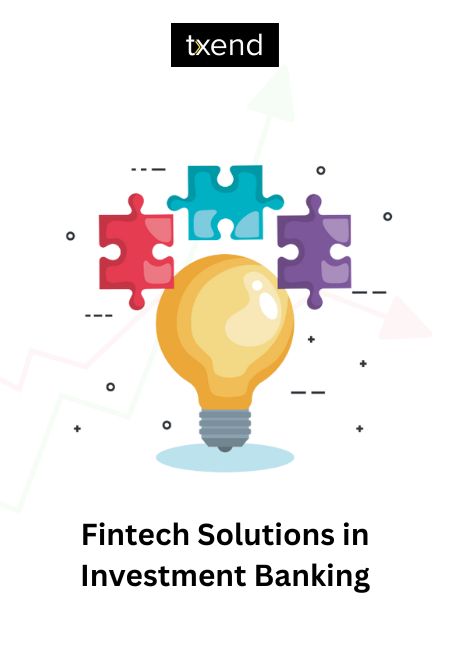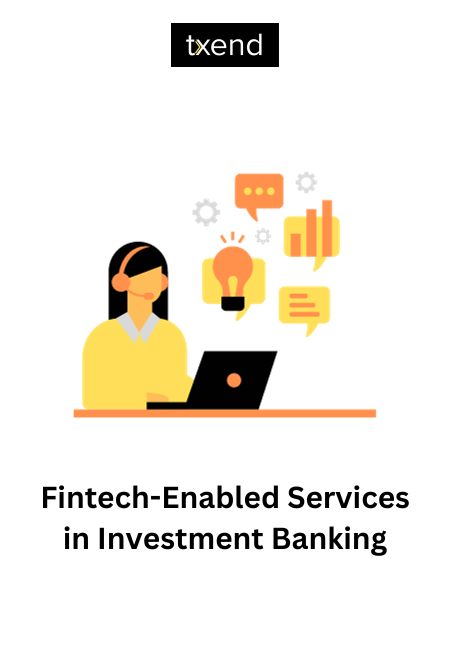In the fast-evolving landscape of finance, fintech investment banking has emerged as a transformative force. This convergence of financial technology and investment banking is reshaping the industry’s traditional paradigms.
As technology redefines how we conduct financial transactions, investment banking is no exception. In this era of innovation, the Fintech revolution has set its sights on the world of investment banking, offering novel approaches and solutions that promise efficiency, accessibility, and agility.
Fintech Investment Banking
This article explores the dynamic realm where fintech and investment banking intersect, providing insights into the pivotal role fintech plays in modernizing financial services.
From top fintech investment banks to the why and how of fintech integration in investment banking, we delve into the trends, challenges, and opportunities shaping this exciting fusion.
Discover how fintech is revolutionizing investment banking, driving unprecedented changes in the financial sector, and impacting businesses and individuals alike.
Join us on this journey to explore the synergy between technology and finance, where financial technology investment banking is at the forefront of innovation and transformation.
Key Takeaways
- Streamline processes, enhance efficiency, and diversify investment options in investment banking.
- Digital platforms offer efficient, innovative, and accessible services in investment banking.
- Regulatory compliance, cybersecurity, and integration challenges are critical hurdles in US fintech-driven investment banking.
- Robust cybersecurity, compliance, and talent acquisition help mitigate fintech-driven investment banking challenges.
- Future trends include blockchain, AI, sustainability, and global expansion in financial technology investment banking.
- Fintech in investment banking revolutionizes efficiency, accessibility, and innovation.
- Collaboration with fintech fosters innovation, efficiency, and broader market reach in US investment banking.
- Fintech drives efficiency, innovation, and diverse investment options in investment banking.
Fintech Solutions in Investment Banking
In the USA, fintech solutions have catalyzed a remarkable transformation in the field of investment banking. The integration of digital technologies has ushered in a new era, revolutionizing traditional banking models.
Investment banks are no longer tethered to outdated practices; instead, they are embracing fintech to enhance their operations.

Digital transformation lies at the heart of this evolution. Fintech is enabling investment banks to streamline their processes, automate tasks, and reduce operational costs.
Through the adoption of cutting-edge technologies, traditional banking models are becoming more agile and efficient. Thanks to automation and artificial intelligence, tasks that once required hours of manual effort can now be executed in seconds.
Moreover, fintech is redefining the customer experience in investment banking. The use of Fintech apps and platforms has created a seamless and user-friendly interface for clients. Transactions are executed swiftly and securely, offering clients unparalleled convenience.
Fintech is also fostering collaborative banking partnerships. Traditional investment banks are partnering with fintech companies to leverage their specialized expertise.
This collaboration allows banks to offer a broader array of services while maintaining high security and compliance standards.
In essence, fintech solutions in investment banking are revolutionizing financial services in the USA. This digital transformation enhances operational efficiency, reimagines customer interactions, and drives innovation.
Investment banks that embrace fintech are better positioned to adapt to the evolving financial landscape, offering clients a modernized and agile approach to managing their finances.
Fintech-Enabled Services in Investment Banking
Certainly, here’s a concise overview of Fintech-Enabled Services reshaping investment banking in the USA:

Online Trading Revolution:
Fintech has propelled the rise of intuitive and accessible online trading platforms. Investors can execute trades swiftly, access real-time market data, and make informed decisions effortlessly.
Seamless Digital Wealth Management:
Fintech has democratized wealth management through digital wealth management solutions. Algorithms and AI-driven platforms offer personalized investment strategies, making wealth management accessible to a broader demographic.
Crowdfunding Opportunities:
Fintech has opened new avenues for investment through crowdfunding platforms. Investors can participate in funding startups, real estate projects, and more, diversifying their portfolios and supporting entrepreneurial ventures.
Peer-to-Peer Lending:
Fintech’s influence is evident in the proliferation of peer-to-peer lending platforms. These platforms connect borrowers directly with lenders, reducing the need for intermediaries and providing competitive loan options.
These fintech-enabled services redefine investment banking, offering clients convenience, accessibility, and a broader range of investment opportunities.
10 Challenges In Fintech-Driven Investment Banking
Regulatory Compliance:
The complex regulatory environment in the USA poses a significant challenge for fintech-driven investment banking. Ensuring compliance with financial regulations while innovating can be a delicate balance.
Data Security:
Handling sensitive financial data is a fundamental aspect of investment banking. Fintech solutions must prioritize robust cybersecurity measures to protect against data breaches and cyber threats.
Cyber Threats:
The financial sector is a prime target for cyberattacks. Fintech-driven investment banks need to continuously strengthen their cybersecurity infrastructure to safeguard client data and assets.
Integration Challenges:
Integrating fintech solutions into traditional investment banking operations can be challenging. Legacy systems may not easily adapt to new technologies, leading to operational inefficiencies.

Client Trust:
Establishing and maintaining trust is crucial in investment banking. Fintech advancements must demonstrate their dependability and security to instill confidence in both clients and investors.
Market Competition:
Fintech-driven investment banking is a rapidly evolving field with intense competition. Staying ahead of competitors and continuously innovating is essential for success.
Scalability:
As financial technology investment banking services grow, scalability becomes a concern. Meeting the demands of a larger client base while maintaining quality service can be challenging.
Partnerships and Collaborations:
While fintech partnerships can drive innovation, they also require navigating complex negotiations and ensuring mutually beneficial terms.
Talent Acquisition:
Attracting and retaining top talent with expertise in both finance and technology is crucial for fintech-driven investment banks. The competition for skilled professionals is fierce.
Market Volatility:
Financial markets inherently fluctuate, demanding swift adaptation from fintech-driven investment banks amid unpredictable shifts.
Mitigations for the challenges in fintech-driven investment banking
Regulatory Compliance:
Forge strong collaborations with legal and compliance units to ensure that fintech innovations align seamlessly with existing regulatory frameworks. Stay updated on regulatory changes and adapt swiftly.
Data Security:
Invest in cutting-edge cybersecurity technologies, conduct regular security audits, and prioritize employee training on data protection. Encryption and multi-factor authentication are crucial.
Cyber Threats:
Implement robust cybersecurity protocols, including intrusion detection systems and threat monitoring. Stay vigilant for emerging cyber threats and invest in threat intelligence.
Integration Challenges:
Prioritize interoperability when choosing fintech solutions. Employ experienced IT teams to ensure seamless integration and consider gradual adoption to minimize disruption.
Client Trust:
Be transparent about security measures and compliance efforts. Regularly communicate updates on cybersecurity enhancements to reassure clients.
Market Competition:
Cultivate an organizational culture centered on fostering innovation. Continuously monitor market trends and consumer demands to adapt and innovate proactively.
Scalability:
Invest in scalable infrastructure and technologies that can grow with the business. Conduct stress testing to identify potential scalability bottlenecks.
Partnerships and Collaborations:
Develop clear partnership agreements that outline responsibilities and expectations. Engage legal expertise in drafting contracts and ensure alignment with strategic goals.
Talent Acquisition:
Create a competitive compensation package to attract top fintech and finance talent. Encourage cross-functional training to bridge the gap between finance and technology expertise.
Market Volatility:
Diversify investment portfolios and develop risk management strategies to mitigate the impact of market fluctuations. Stay informed about geopolitical and economic factors that influence market behavior.
Fintech Investment Banking Trends and Innovations in the USA

Blockchain and Digital Assets:
Financial technology investment banking is poised to see increased adoption of blockchain technology for secure transactions and the rise of digital asset investment platforms.
AI and Machine Learning:
AI-driven analytics and machine learning algorithms will continue to play a pivotal role in predictive analytics for investment decisions and risk management.
Sustainable Finance:
There’s a growing emphasis on sustainable and ESG (Environmental, Social, and Governance) investing. Fintech solutions will facilitate the integration of ESG criteria into investment strategies.
RegTech Advancements:
Regulatory technology (RegTech) solutions will streamline compliance processes, reducing costs and ensuring adherence to complex financial regulations.
Personalized Wealth Management:
Fintech investment banks will offer more personalized and AI-driven wealth management solutions, tailoring investment portfolios to individual preferences and goals.
Cross-Border Investments:
Fintech is set to facilitate smooth cross-border investments, erasing geographical barriers for broader investment access.
Digital Identity and Security:
Enhanced digital identity verification and biometric security measures will bolster trust and security in online investment transactions.
Tokenization of Assets:
Traditional assets such as real estate and art will become more liquid through tokenization, allowing fractional ownership and trading on blockchain platforms.
Decentralized Finance (DeFi):
DeFi platforms will gain prominence, offering decentralized lending, borrowing, and trading opportunities, potentially reshaping traditional banking services.
Open Banking Initiatives:
Open banking regulations will foster collaboration between fintech firms and traditional banks, resulting in innovative financial products and services.
Cybersecurity Advancements:
As cyber threats evolve, fintech investment banks will invest in advanced cybersecurity measures and threat intelligence to protect client assets and data.
AI-Driven Risk Assessment:
AI will be increasingly utilized to assess investment risks, providing more accurate and real-time risk evaluations.
Quantum Computing:
In the longer term, quantum computing may revolutionize complex financial modeling and algorithmic trading strategies.
These trends and innovations highlight the transformative potential of fintech in investment banking in the USA, shaping the future of financial services and investment strategies.
Why Fintech Investment Banking?
Fintech investment banking is reshaping the financial services landscape in profound ways, driven by several compelling reasons:
Efficiency and Automation:
Fintech solutions automate and streamline various financial processes, reducing manual workloads and human errors.
This efficiency translates to faster transaction times, reduced costs, and improved operational accuracy.
Enhanced Accessibility:
Financial technology investment banking democratises access to financial services.
It eliminates geographical barriers and provides a broader spectrum of individuals and businesses with access to investment opportunities, previously limited to traditional investors.
Innovation in Financial Products:
Fintech investment banks introduce innovative financial products and services that cater to evolving market demands.
These offerings often incorporate cutting-edge technologies like blockchain, AI, and machine learning, providing investors with diversified and sophisticated options.
Cost Savings:
Traditional investment banking typically involves high fees and administrative costs.
Fintech-driven platforms tend to offer more cost-effective solutions, making investment opportunities accessible to a wider range of investors.
Real-Time Data and Insights:
Fintech investment banking leverages data analytics and real-time data streams, enabling investors to make more informed decisions.
This access to timely insights enhances portfolio management and risk assessment.
Security and Transparency:
Fintech platforms give precedence to robust cybersecurity measures and blockchain technology, ensuring secure and transparent financial transactions..
This builds trust among investors, particularly in an era of increasing cyber threats.
Globalization of Investments:
Fintech platforms facilitate cross-border investments, allowing investors to easily diversify their portfolios by accessing international markets and assets.
Regulatory Compliance:
Fintech investment banks are keen on regulatory compliance.
They develop solutions that align with financial regulations and employ RegTech tools to ensure adherence, reducing regulatory risks.
Personalization:
Fintech investment platforms offer personalized investment solutions tailored to individual investor profiles, risk tolerance, and financial goals.
This customization enhances the investor experience and satisfaction.
Collaboration and Partnerships:
Fintech investment banks often collaborate with traditional financial institutions, creating synergies that harness the strengths of both sectors.
These partnerships drive further innovation and expansion.
In conclusion, financial technology investment banking is revolutionizing financial services by making them more accessible, efficient, and technologically advanced.
It caters to the evolving needs of investors while addressing traditional banking limitations, ultimately shaping the future of investment banking in the USA and beyond.
How Collaboration with Fintech Transforms Investment Banking?
Collaboration with fintech firms is revolutionizing investment banking in the USA in several key ways:
Innovation Catalyst:
Fintech companies bring cutting-edge technologies and innovative financial solutions to the table.
Collaboration enables investment banks to harness these innovations, elevating their services and maintaining competitiveness in a swiftly evolving market.
Enhanced Customer Experience:
Fintech collaboration results in the development of user-friendly digital platforms and applications.
This leads to a superior customer experience, offering investors easy access to investment opportunities, real-time data, and personalized services.
Efficiency Gains:
Fintech solutions streamline and automate various investment banking processes, reducing operational costs and increasing efficiency.
This efficiency benefits both investment banks and their clients, as transactions are executed faster and with fewer errors.
Access to New Markets:
Fintech partnerships often open doors to new markets and customer segments. Investment banks can tap into previously untapped markets and demographics, expanding their reach and potential client base.
Diversified Investment Opportunities:
Partnering with fintech empowers investment banks to broaden their spectrum of investment products and services.
This includes access to alternative assets, such as cryptocurrencies and tokenized assets, which were previously outside the scope of traditional investment banking.
Data-Driven Decision-Making:
Fintech solutions provide advanced data analytics capabilities. Investment banks can harness these tools to make data-driven investment decisions, improve risk assessment, and optimize portfolio management.
Regulatory Compliance:
Many fintech firms specialize in regulatory technology (RegTech). Collaboration helps investment banks navigate complex financial regulations efficiently, ensuring compliance while reducing compliance-related costs.
Partnerships with Niche Experts:
Fintech partnerships often involve collaboration with niche fintech experts who have specialized knowledge and skills. This enables investment banks to access specialized expertise and stay at the forefront of industry trends.
Cost-Effective Solutions:
Fintech solutions are often cost-effective compared to traditional systems and processes. This can translate into cost savings for investment banks and their clients, making investment services more accessible.
Risk Mitigation:
Collaboration with fintech firms can enhance risk management by using advanced risk assessment tools and real-time monitoring, reducing exposure to potential financial risks.
In summary, collaboration with fintech firms transforms investment banking in the USA by driving innovation, improving efficiency, expanding market reach, and enhancing the overall quality of services. It positions investment banks to meet the evolving needs of investors in an increasingly digital and competitive landscape.
How Fintech Impacts Investment Banking?
Innovation and Efficiency:
Fintech introduces innovative technologies and automation to streamline investment banking processes. This leads to heightened efficiency, reduced operational expenses, and faster transaction processing.
Enhanced Customer Experience:
Fintech solutions offer user-friendly interfaces, giving investors easy access to investment opportunities and real-time data. This improved customer experience fosters client satisfaction and loyalty.
Diversified Investment Products:
Fintech expands the range of investment products and services available to clients. It introduces access to alternative assets like cryptocurrencies and tokenized assets, offering diversified investment opportunities.
Data-Driven Decisions:
Fintech leverages data analytics and AI to provide investment banks with data-driven insights.
This aids in making informed investment decisions, managing risks, and optimizing portfolio performance.
Cost Savings:
Fintech solutions are often cost-effective compared to traditional systems. This can lead to cost savings for investment banks and clients, making investment services more accessible.
Global Reach:
Fintech facilitates cross-border investments, enabling investors to access international markets and assets easily. It breaks down geographical barriers and fosters global investment opportunities.
Regulatory Compliance:
Fintech includes regulatory technology (RegTech) that helps investment banks navigate complex financial regulations efficiently, ensuring compliance and reducing regulatory risks.
Partnerships and Collaboration:
Investment banks often collaborate with fintech firms to access specialized expertise and technology. These partnerships drive innovation and enable banks to stay competitive.
Risk Management:
Advanced fintech tools provide real-time risk assessment and monitoring capabilities. This enhances risk management practices, reducing exposure to financial risks.
Market Adaptation:
Fintech adoption allows investment banks to adapt swiftly to changing market conditions and evolving investor preferences. It positions banks to thrive in an increasingly digital financial landscape.
In conclusion, fintech profoundly impacts investment banking by introducing innovation, improving efficiency, diversifying investment opportunities, and enhancing the overall quality of services. It enables investment banks to serve their clients better and navigate the evolving financial landscape effectively.
Frequently Asked Questions
Fintech streamlines investment banking, enhancing efficiency, accessibility, and innovation.
Technologies like blockchain, AI, and data analytics drive fintech innovation in banking.
Online platforms provide real-time data and diverse investment options for fintech-savvy investors.
Complex financial regulations pose compliance challenges for fintech in banking.
Quantum computing is poised to disrupt finance, offering unprecedented computational power for complex financial modeling and analysis.
Summarizing Fintech Investment Banking
In the ever-evolving landscape of investment banking, fintech emerges as a catalyst for transformation. Fintech investment banking, characterized by innovation, efficiency, and collaboration, is key to reshaping financial services.
As top fintech investment banks harness the power of technology and establish strategic fintech banking partnerships, the industry experiences a paradigm shift.
Fintech not only addresses the challenges of regulatory compliance and cybersecurity but also enhances accessibility, personalization, and cost-effectiveness.
Fintech-driven investment banking stays at the forefront of market trends by incorporating advanced analytics, diversifying investment products, and improving the customer experience.
The impact of fintech on investment banking extends beyond efficiency gains; it empowers investors with data-driven insights, diversified opportunities, and global reach.
This synergy between finance and technology mitigates risks, adapts to market fluctuations, and fosters innovation in financial services.
In the USA and across the globe, fintech investment banking is no longer a choice but a necessity.
It’s reshaping the financial landscape, bridging the divide between traditional banking and the digital future. As fintech continues to reshape investment banking, embracing its potential becomes paramount for institutions aiming to thrive in the fintech-driven era of financial services.



